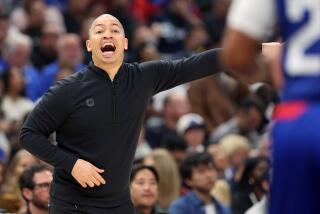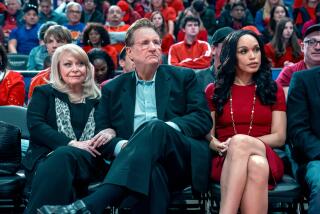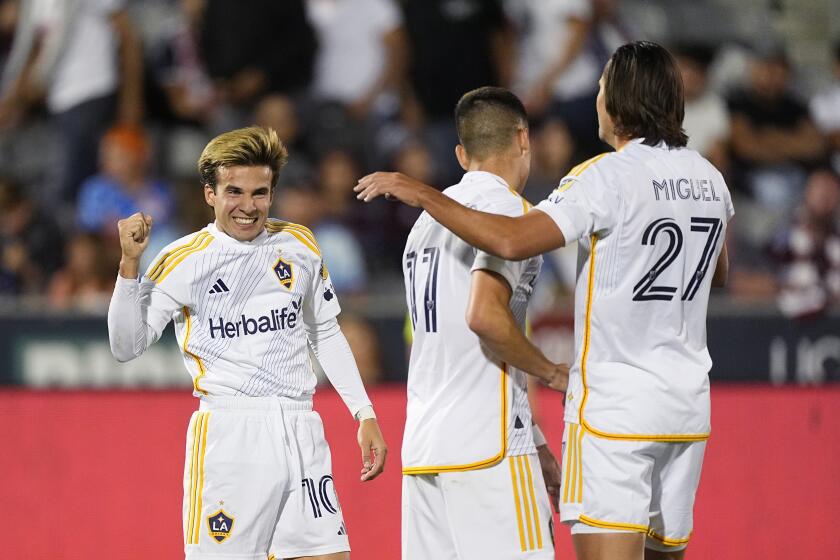On the Road Again
The life and coaching times of Larry Brown, who resigned Thursday as coach of the Clippers:
* MAY-JULY, 1969, DAVIDSON COLLEGE (NO GAMES)--Brown, then 28, had led the American Basketball Assn. in assists and been All-Star game most valuable player as point guard for the Oakland Oaks, but he was still something of a legend in North Carolina, where he had played for the Tar Heels.
Davidson College hired Brown to replace Lefty Driesell as coach when Driesell went to Maryland. Brown reported for work when his ABA season ended, but the job lasted only a few weeks, Brown resigning in a dispute over proceeds from a lucrative summer camp Driesell had started at Davidson.
A camp worker, Terry Holland, who was a Driesell assistant, became Davidson’s coach. Brown rejoined his ABA team, which had become the Washington Capitols, and again led the ABA in assists.
* 1972-74, CAROLINA COUGARS (111-73)--With his playing career ending in Denver, where he was third in the league in assists for a last-place team in 1972, Brown returned to North Carolina, where he was joined by a college and ABA teammate, Doug Moe. They won the ABA Eastern Division in their first season with players such as Billy Cunningham, and stayed with the Cougars one more year.
* 1974-79, DENVER NUGGETS (272-158)--Returning with Moe to the city where he finished his playing career, Brown won the Midwest Division in the ABA’s final two seasons, then the Midwest for two seasons after the Nuggets were absorbed into the NBA. In his fifth season, Brown resigned on Feb. 1, citing unspecified pains. Said Brown: “I had a checkup today and the doctor said I’ve got some tension problems--which is an NBA coaches’ disease.”
* 1979-81, UCLA (42-17)--By March 28, he was well enough to accept the Bruins’ job, which he has called his “proudest moment.”
He replaced Gary Cunningham, who had resigned. In Brown’s first season as coach, the Bruins went to the Final Four, losing to Louisville in the championship game. In his second season, UCLA lost to Brigham Young in the first round of the NCAA tournament, and Brown grew testy about questions concerning his future instead of his team’s play.
* 1981-83, NEW JERSEY (91-69)--Brown had been making $50,000 a year, plus $50,000 from an apparel company, while at UCLA, where five alumni pooled resources to provide him a house in Brentwood. The Nets offered $900,000 for four years.
He took a Net team that had been in last place in the NBA Eastern Division to the playoffs in his first full season and had a better record in his second, making the playoffs before announcing on April 7, 1983 that he had accepted an offer to coach at Kansas. Net owner Joe Taub told Brown his services were not required for the playoffs.
* 1984-88, KANSAS (129-44)--”I wouldn’t consider just any job,” Brown said. “Kansas is special. It had to be a special job.”
He took the Jayhawks to the NCAA title in 1988, helped along by Danny Manning, the team’s star; and Ed Manning, Danny’s father, Kansas’ assistant and Brown’s former teammate in the ABA. Brown had said leaving UCLA was his biggest mistake, and before the championship game in 1988, rumors had begun about Brown returning to the Bruins, after Walt Hazzard was fired.
Southern California high school players said when they were recruited by him they were asked how they would feel playing for him at Kansas or UCLA. Less than an hour after a pep rally celebrating the NCAA championship at Lawrence, Kan., Brown was called by UCLA and told he was the school’s top choice. Four days later, he agreed to return to Westwood. A day after that, on April 8, he decided to stay in Kansas, saying, “I belong here.”
* 1988-92, SAN ANTONIO SPURS--He no longer belonged on June 13. Kansas was still “special,” but the Spurs were a “once-in-a-lifetime opportunity,” Brown said. It was worth $3.5 million for five years.
The first was a franchise low, a 21-61 record that was 10 games worse than the year before. Then David Robinson came into the league, and consecutive Midwest Division championships followed. In Brown’s fourth season, with a 21-17 record, he was given the option of quitting but opted to be fired by owner Red McCombs on Jan. 21. Brown said it was time to take stock of his life in basketball.
* 1992-93, CLIPPERS--Taking stock apparently took a little more than two weeks, because Brown became Clipper coach, replacing Mike Schuler, on Feb. 6 and put them in the playoffs. He did the same thing this season, then suddenly quit on Thursday.
More to Read
Go beyond the scoreboard
Get the latest on L.A.'s teams in the daily Sports Report newsletter.
You may occasionally receive promotional content from the Los Angeles Times.










